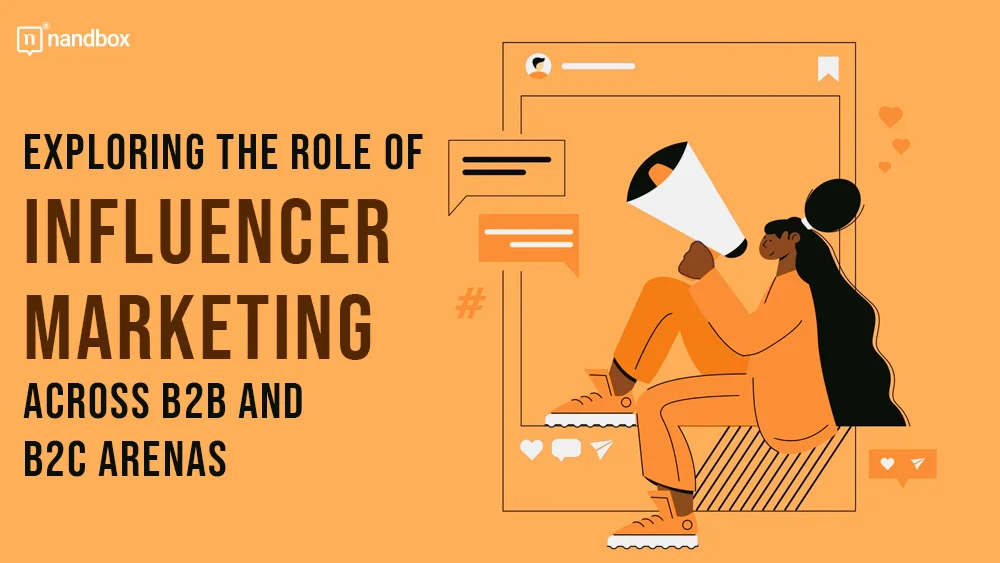Influencer marketing is a type of advertising that allows companies to work with people who have a following in order to boost brand awareness. It is the newest and most availed form of marketing strategy being implemented by small businesses and even large-scale enterprises to foster engagement and establish credibility.
Influencer Marketing in B2B
The goal of B2B influencer marketing is to increase the visibility and reputation of your business by collaborating with well-known industry personalities. Influencer marketing typically yields higher brand visibility, higher ROI, warmer leads, and increased engagement.
Efficient business-to-business influencer marketing capitalizes on the most established and potent marketing tactic available: word-of-mouth, especially from professionals in the field. And in order to do it well, you must establish connections with the appropriate individuals ahead of your rivals.
Benefits of Influencer Marketing in B2B
The key benefits of influencer marketing in B2B are as follows.
Enhancing the Brand Value
Building greater interest in their product or service is, according to nearly 60% of brands, their main priority when it comes to influencer marketing. Search engines, social networks, and marketplace algorithms function similarly. The more individuals interact with your content, the greater the exposure of the content to other audiences.
Brand Visibility
A recent study published in Nature reveals that parasocial influence is a potent factor in “brand credibility and purchase attention” in research. Ask influencers to assist you in producing informative, entertaining, or otherwise value-adding material, and then utilize their knowledge and authority in your field to spread the word about it via all of your and their networks.
Influencer Marketing in B2C
Narrative has emerged as a crucial instrument for grabbing consumers’ attention in a world where advertisements and marketing messages are constantly present. Additionally, companies may use influencer marketing to use the storytelling potential of their audience to produce content that not only advertises their goods and services but also engages them with an engaging narrative.
Influencer marketing has shown to be especially successful for business-to-consumer (B2C) companies because it allows them to connect with their target market in a more engaging and personalized way. However, you do need to consider what is the downside of using a micro or nano influencer for an effective partnership.
Benefits of Influencer Marketing in B2C
The major benefits of influencer marketing in B2C are:
Tapping The Target Customers
Influencers have amassed a devoted fan base of involved individuals who value and rely on their advice. You can more successfully reach your target audience by collaborating with influential people in your field than you can with conventional advertising techniques.
Trust Building
Strong relationships exist between influencers and their followers, and followers are often quite receptive to their recommendations. Brands may gain credibility with their target audience and tap into that trust by collaborating with influencers.
Building Brand Awareness
Influencers can aid in raising brand recognition by disseminating content about your company to their large following on social media. When it comes to supporting young or developing firms to establish an online presence, this can be especially helpful.
Understanding the Mechanism
Influencer marketing has the potential to be an effective strategy for raising brand awareness. In order to boost your brand recognition and credibility, you can reach new markets, amplify your brand messaging, tap into the content creation abilities of influencers who share your values, and make use of their knowledge.
Content Creation
Extensively, influencers can be trusted to tap into the audience’s pockets of interest and provide authentic material. Brands, as well as brands, can get into the act by involving influencer partnerships to produce sponsored content, product reviews and other media materials, thereby increasing the frequency at which brands can have content production.
Using The Network of Influencers
Because they are frequently authorities in their domains, influencers may help establish your company as a market leader by imparting their knowledge and skills to their followers. You may improve brand awareness and credibility with your target audience by collaborating with influencers who are well-known in your field.
Tapping New Market
Influencers frequently have a fan base within a certain demographic or niche. You can raise brand awareness in a new market or demography by collaborating with influencers who are well-liked in that particular area.
How Influencer Marketing Makes an Impact on Business
Influencer marketing has the potential to enhance consumer trust by humanizing a business, presenting social proof, and educating customers about goods and services. Influencer marketing, when done correctly, may establish enduring bonds between companies and their clientele, boosting engagement, revenues, and loyalty.
The Human Touch In Tech
Influencer marketing has the power to humanize a business and increase consumer relatability. Brands may produce relatable and genuine content for their target audience by collaborating with influencers who share their values and messaging.
Authenticity
As was previously noted, influencers have cultivated a devoted fan base of involved individuals who value and rely on their advice. Influencers who endorse goods or services that they use and support have a greater chance of winning over their followers to trust their recommendations and give the product or service a try.
Social Validation
Additionally, influencer marketing can give firms social evidence. Customers are more likely to believe in a brand and think highly of a product when they see their favorite influencers using and promoting it.
The Difference in Influencer Marketing In B2B And B2C
The way influence is defined and quantified is one of the key distinctions between influencer marketing for B2B and B2C. Influencer popularity, personality, and style, as well as the size and reach of the influencer’s audience, are all important factors for B2C brands. B2C influencers have the power to increase sales, traffic, and awareness for goods and services that cater to specialized or mass audiences.
Influencer marketing for B2B brands is mostly about the authority, skill, and relevance of the influencer, in addition to their capacity to provide leads, conversions, and recommendations for solutions that address difficult issues or necessitate sustained financial outlays.
Conclusion
Influencer marketing is truly an effective way to market for both B2B and B2C businesses. With several positives, you also need to consider what is the downside of using a micro or nano influencer, as a selection of influencers is the most important part of influencer marketing, as the future of your business depends on your vision and ability to make the right decision at the right time.





